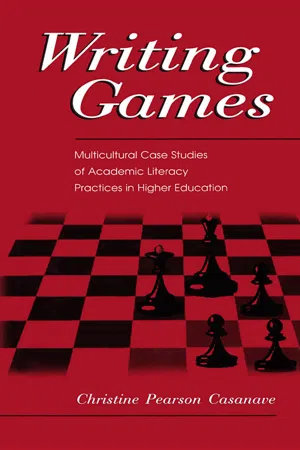
Writing Games
Multicultural Case Studies of Academic Literacy Practices in Higher Education
- 336 pages
- English
- ePUB (mobile friendly)
- Available on iOS & Android
Writing Games
Multicultural Case Studies of Academic Literacy Practices in Higher Education
About This Book
This book explores how writers from several different cultures learn to write in their academic settings, and how their writing practices interact with and contribute to their evolving identities as students and professionals in academic environments in higher education. Embedded in a theoretical framework of situated practice, the naturalistic case studies and literacy autobiographies include portrayals of undergraduate students and teachers, master's level students, doctoral students, young bilingual faculty, and established scholars, all of whom are struggling to understand their roles in ambiguously defined communities of academic writers. In addition to the notion of situated practice, the other powerful concept used as an interpretive framework is captured by the metaphor of "games"--a metaphor designed to emphasize that the practice of academic writing is shaped but not dictated by rules and conventions; that writing games consist of the practice of playing, not the rules themselves; and that writers have choices about whether and how to play. Focusing on people rather than experiments, numbers, and abstractions, this interdisciplinary work draws on concepts and methods from narrative inquiry, qualitative anthropology and sociology, and case studies of academic literacy in the field of composition and rhetoric. The style of the book is accessible and reader friendly, eschewing highly technical insider language without dismissing complex issues. It has a multicultural focus in the sense that the people portrayed are from a number of different cultures within and outside North America. It is also a multivocal work: the author positions herself as both an insider and outsider and takes on the different voices of each; other voices that appear are those of her case study participants, and published authors and their case study participants. It is the author's hope that readers will find multiple ways to connect their own experiences with those of the writers the book portrays.
Frequently asked questions
Information
Table of contents
- Cover Page
- Title Page
- Copyright Page
- Foreword
- Preface
- Chapter 1: Games and Frames: When Writing Is More Than Writing
- Chapter 2: The Beginnings of Change: Learning and Teaching Undergraduate Academlc Literacy Games
- Chapter 3: Stepping Into the Profession: Writing Games in Masters Programs
- Chapter 4: Redefining the Self: The Unsettling Doctoral Program Game
- Chapter 5: Juggling and Balancing this new and serious game
- Chapter 6: Bending the Rules
- Chapter 7: The Paradoxical Effort After Coherence in Academic Writing Games
- Appendices
- References